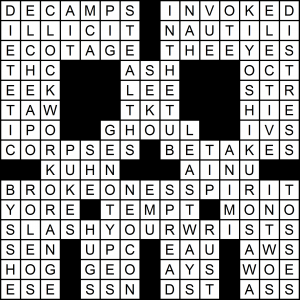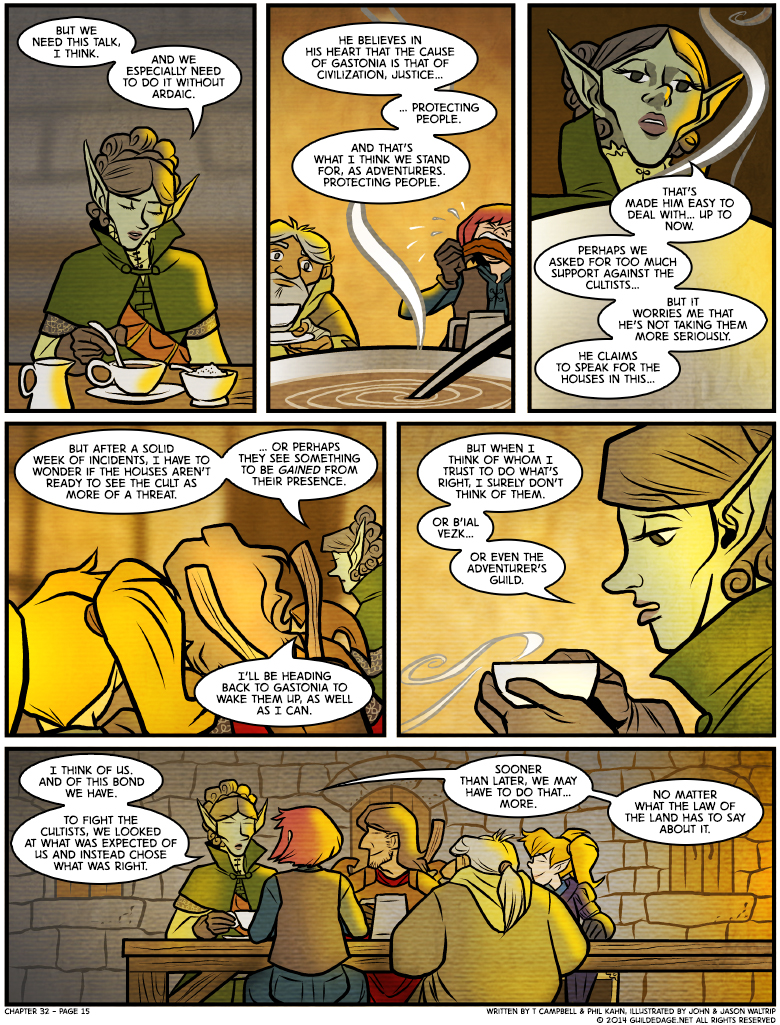Annotated 32-15
 You always have a choice. But there are no good choices. No matter which way you turn, you end with blood on your hands, a self-destructive neurosis perched on your chest, or some predatory force at your heels that you’ve unwittingly unleashed. You didn’t mean to lose your temper there, but you did. You didn’t mean to attract that man’s attention, but you know he’s following you now. You can’t win, you can’t break even, you can’t get out of the game. In the world of Death by Strokes, you do choose the ending… but that just means the real horror comes from you.
You always have a choice. But there are no good choices. No matter which way you turn, you end with blood on your hands, a self-destructive neurosis perched on your chest, or some predatory force at your heels that you’ve unwittingly unleashed. You didn’t mean to lose your temper there, but you did. You didn’t mean to attract that man’s attention, but you know he’s following you now. You can’t win, you can’t break even, you can’t get out of the game. In the world of Death by Strokes, you do choose the ending… but that just means the real horror comes from you.
I’ve dipped a little toe into scary stories now and again, usually as part of a larger series. We’re coming up on the horror phase of Guilded Age as seen in Chapter 35 and especially 36. Penny and Aggie‘s Aggie once went through a genuinely deadly dream as her body struggled with an allergic reaction while her subconscious served up monsters and a suicidal siren song. And the Fans characters’ adventures turned terrifying now and again, usually less because of whatever monsters they were fighting and more because of the personal demons lurking in their own psyches, waiting to be dredged up.
But the most consistently “horror” project I did was not a comics project at all: it was a suite of horror-themed crossword puzzles called Grids of Terror. Practically nobody bought it, but I found it an interesting experiment all the same. Scott McCloud talks about the potential of comics as a more participatory medium than TV or movies, because you the reader decide things like pace and how the characters sound in your head. Puzzles are more participatory yet, and while movies can be scary because they’re out of our control, I liked the idea of doing something more interactive, making the reader feel they have a hand in their own demise.
Ultimately, I’d want to say something about that feeling. There’s no shortage of things to be afraid of in 2021, but fundamental fears underlie many of them. Just as The Good Place concludes that the world is far too complex and filled with unintended consequences to judge humans’ actions fairly with the old system, I think one of the most insidious things about our world is how we seem to be forced either to care about nothing or to care far too much about everything (“Global warming is ALL YOUR FAULT! YOU PERSONALLY, KENNETH!”). Despite the awfulness that humans are capable of and the real need to deal with the worst of us, most of us, for the most part, have to forgive each other, and forgive ourselves. I’m not speaking of divine grace here, only the human kind. I can imagine a world without that grace easily enough, and I don’t know if I can think of anything scarier than that.











“I think one of the most insidious things about our world is how we seem to be forced either to care about nothing or to care far too much about everything (“Global warming is ALL YOUR FAULT! YOU PERSONALLY, KENNETH!”).”
It is insidious; but it is also deliberate action by the industrial lobbies. There have been many campaigns attempting to responsibilize individual consumers, knowing full well that it wouldn’t work, because putting the onus on individual responsibility allows to avoid putting it on collective responsibility — i.e. the state, through regulation. It’s like the whole “voting with your wallet” saw, as if it worked when the unethical corporations own pretty much everything anyway so you can’t avoid funding them.
Instead of banning non-reusable packaging, just fund some PSA campaign about not littering. The industry is happy because they can keep up what they’re doing without a change, and you can pretend you’ve acted for the environment!
I simultaneously completely agree with you and T, and also think it’s not quite that deliberately insidious (intentional or otherwise).
I think it’s sheer scale of society versus limited brain architecture for contemplating consequences of such scale, individually.
Rightful “delegation” at scale becomes oppressive demand. “Cheerleading” at scale becomes cheap solicitations and emotional tricks. “Admonishment” at scale becomes fearmongering, shame, ridicule, etc. And “authority” at scale becomes nakedly abusive power.
I assert that no particular set of humans are likely to do so well at such scale as to make society at our scale harmonious, uplifting, provident, and equitable. I also assert we could find a set that would do a damned sight better than we are doing, but then over time it would still decay into the first observations.
Long run, I believe in Archipelago. I think we need the central machinery for one purpose alone – to help individuals find their actual place of belonging, and provide access and transit from one’s circumstances to their desired destination. And then otherwise let a million small human communities blossom.
I am so much happier and stress free not giving a shit which particular over-75 white guy sits in a round room it’s not even funny. I work on smaller problems that I can meaningfully change, and I see things improve, and I am fulfilled. And the world spins madly on.
Huh. Hey, who put this soapbox here? Be careful, someone could trip 😄
Um, if it’s not deliberate, it’s certainly pervasive and seems to be done against obvious better judgment.
Like, take Steven Pinker’s massively acclaimed book of a few years back, “Enlightenment Now”, where he uses some fancy graphics to put all the benefits of industrialization into a wicker basket, and then ascribing it wholeale to Teh Enlightenment, simultaneously divorcing the benefits from the equally large drawbacks, and obscuring the latter.
And in a strangely downplayed way, I guess he also sort of takes credit for the benefits? At least on behalf of his tribe of enlightenMen.
It’s strange, because it was a smash hit and very popular with people who really ought to be able to see through the trick…
I think you’re getting exactly to my point – seems to be done against obvious better judgement. I think an outside view makes it easy for you and I to say “a reasonable, honorable, considerate person could do way better than this.” I think in practice when you get in there and have all the levers and buttons and readouts and blinkie lights of the control panel of all the things in front of you, it’s hard to proceed without modestly fucking something up. And thus people take shortsighted, inert, or overly biased action because it’s the best their limited brain architecture can do in the situation.
We have been conducting this science experiment for a couple hundred years now in the USA. I would love a counterexample of a human or committee of such taking on really massive problems like global warming and producing harmonious, beneficial, and long-run positive outcomes. AFAICT we’ve been trying that experiment too for 50-60 years and yet here we are.
We all know the solution is to break up the massively concentrated power that influences people to make net negative choices, and promote experiments and developments that provide superior alternatives (or at least attempt to). Why aren’t we?
Why do we think meeting those powers with equally concentrated power that shames those people, or shames us lay individuals, or demands us to make difficult changes is going to work?
People agree on nothing when it comes to solutions, because we all have different skill sets and perspectives that inform our judgment.
This is why, for example, I’m an ideal worker in my industry, because I don’t buy the industry’s kool-aid to begin with, I’m skilled with computers, and see disorganized documentation as a challenge instead of an insurmountable obstacle – where the CEO of my company sees it as work he has to delegate precisely because he lacks my experience and insight, and probably couldn’t get hired to do it himself at all, but fusses about what investments are intelligent to make so much that he’d ask a novice with no industry experience to write him a solution to help him make better decisions.
We think that the people in power have power because they are powerful, but for the most part they have power because of the sheer quantity of people who are loyal to their whims, and the tools they have access to – who are all just afraid of each other enough to believe they would be “dealt with” by their peers if they were insubordinate.
Breaking up the power would require those people to recognize they have common goals and acknowledge that’s the case – so the seemingly intuitive line of thinking follows, that since no one successfully does this, it must not be true.
And that’s why we’re trapped in a systemic cycle of stupidity.
On a less-serious note: Boy, Frigg really packed away all that food in a hurry!